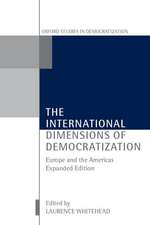Dissonances – Democratic Critiques of Democracy
Autor Guillermo O`donnellen Limba Engleză Hardback – 14 aug 2022
Guillermo O'Donnell here brings together a collection of significant recent essays in which he considers both the method for and substance of critiques of democracies. While progress has been made in democratization, the authoritarian legacy hangs as a shadow over that advancement. O'Donnell engages in his analysis while keeping a firm gaze on that dangerous past.
O'Donnell's work has influenced a generation of political scientists. The essays in this volume bring forward and develop many of the ideas presented in his earlier collection, Counterpoints: Selected Essays on Authoritarianism and Democracy. This work will be of interest to scholars working in justice reform, democratization, and comparative politics.
"For many years, O'Donnell has explored the various ways in which the democracies of Latin America–-many of them new–-failed to meet expectations held out for them by citizens, analysts, and political actors. The articles collected here represent some of the very best thinking by an author who remains one of the most creative and insightful political theorists, whose work is deeply grounded in empirical observation, whose ideas are consistently robust, and whose reflections can be both provocative and of great practical use." –-Charles D. Kenney, University of Oklahoma
| Toate formatele și edițiile | Preț | Express |
|---|---|---|
| Paperback (1) | 177.57 lei 6-8 săpt. | |
| MR – University of Notre Dame Press – 31 aug 2007 | 177.57 lei 6-8 săpt. | |
| Hardback (1) | 586.29 lei 6-8 săpt. | |
| MR – University of Notre Dame Press – 14 aug 2022 | 586.29 lei 6-8 săpt. |
Preț: 586.29 lei
Preț vechi: 761.42 lei
-23% Nou
Puncte Express: 879
Preț estimativ în valută:
112.19€ • 115.92$ • 93.33£
112.19€ • 115.92$ • 93.33£
Carte tipărită la comandă
Livrare economică 20 martie-03 aprilie
Preluare comenzi: 021 569.72.76
Specificații
ISBN-13: 9780268206062
ISBN-10: 0268206066
Pagini: 194
Dimensiuni: 159 x 236 x 18 mm
Greutate: 0.43 kg
Editura: MR – University of Notre Dame Press
ISBN-10: 0268206066
Pagini: 194
Dimensiuni: 159 x 236 x 18 mm
Greutate: 0.43 kg
Editura: MR – University of Notre Dame Press
Notă biografică
Recenzii
“In this book, the well-known, highly influential Latin Americanist O'Donnell examines the challenges faced by third-wave democracies in Latin America (and beyond) and those who purport to study and understand them . . . brings together in one volume the insights of a political scientist who worked and lived through some of the worst moments in Latin America's recent past and understands the necessity of holding new democracies accountable if they are to avoid a return to authoritarianism.” —Choice
“In this sequel to Counterpoints, O'Donnell continues his comparative analysis of democracies that have emerged in Latin America in the shadow of authoritarianism. This influential Latin American political scientist tempers neoliberal theories that conflate the state with its bureaucracies with essays on the factors that make for different degrees of legality and 'horizontal accountability' of fledgling democracies.” —Research Book News
“One of Latin America’s most influential political scientists brings together a collection of his recent essays. This volume includes his essays on democratic theory, accountability, the rule of law, and the role of the state in new democracies. While progress has been made in democratization, legacies of authoritarianism and social inequality hang as shadows over that advancement. O’Donnell, whose work has influenced a generation of political scientists, engages in analysis while keeping a firm gaze on the dangers and challenges that lie ahead.” —Abstracts of Public Administration, Development, and Environment
“In an era where the term ‘democracy’ carries enormous normative weight but is thrown around all too easily, a careful analysis of the social and legal structures that support a true democracy is certainly in order. O’Donnell’s analytical framework is solid and thorough, and his application of this overarching scheme to the particular case of Latin America reveals interesting avenues for further research, policy, and activism.” —Journal of International Law and Politics
















